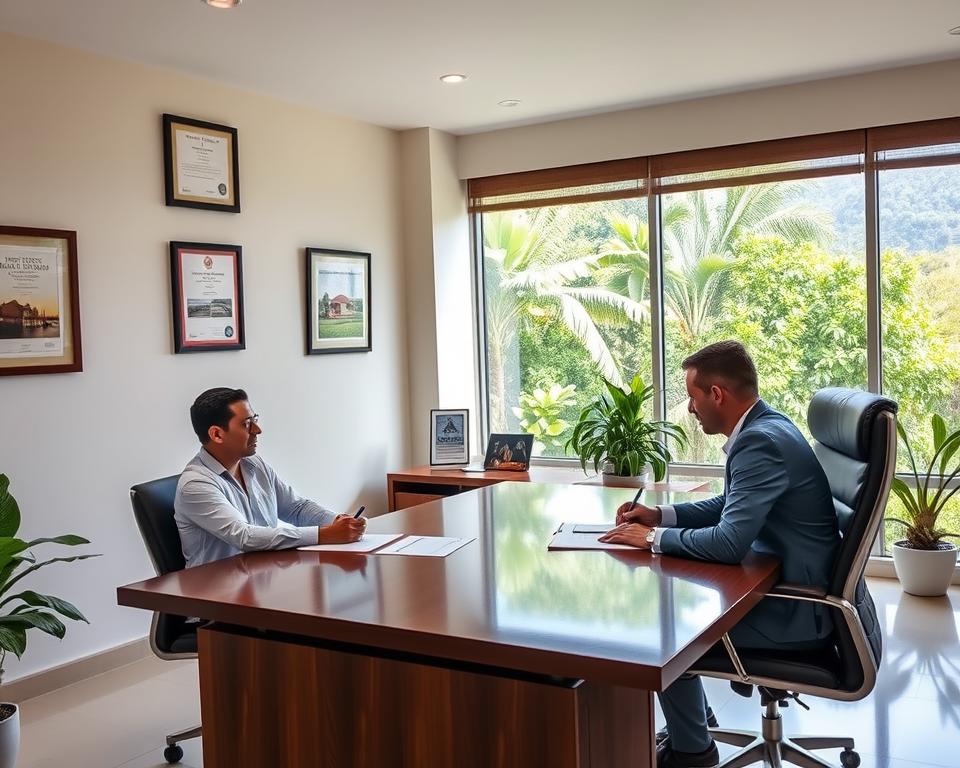Real Estate Negotiation in Costa Rica – Trusted Experts
Navigating the complexities of property transactions in Costa Rica requires a deep understanding of the local market and cultural nuances. With over 20 years of coast-to-coast experience, Gap Real Estate has established itself as a trusted partner for those looking to buy, sell, or invest in this tropical paradise.
The luxury market in Costa Rica presents a unique blend of international business practices and local customs, where the pace of negotiations is crucial. Rushing can be seen as a sign of desperation or disrespect, making patience a valuable asset in successful transactions.
At Gap Real Estate, we simplify the process through expert guidance and clear communication, ensuring seamless transactions that respect local customs while protecting your interests.
Understanding the Costa Rican Real Estate Market
Understanding the intricacies of Costa Rica’s real estate market is crucial for making informed investment decisions. The country’s property market is influenced by various factors, including its natural beauty, legal framework, and economic conditions.
Unique Market Characteristics
The Costa Rican real estate market has several distinct characteristics that set it apart from other markets. These include limited premium inventory and seasonal fluctuations in demand.
Limited Premium Inventory
The availability of high-quality properties in prime locations is limited, which can drive up demand and prices for these properties.
Seasonal Fluctuations
The demand for properties in Costa Rica can vary with the seasons, with certain periods attracting more buyers due to factors like weather and tourist seasons.
Foreign Ownership Rights and Opportunities
Costa Rica offers a welcoming environment for foreign investors, with laws that permit non-residents to own property directly or through a corporation, similar to local citizens. This openness, combined with the country’s stable policies toward foreign investment in real estate, makes it an attractive destination for international buyers.
- Costa Rica allows foreign buyers to own property under the same rights as locals, making it an accessible market.
- Foreigners can own property directly or through a corporation, providing flexibility in investment structuring.
- Understanding local property laws and regulations is crucial for protecting investments.
By grasping these aspects of the Costa Rican real estate market, investors can better navigate the opportunities and challenges it presents.
Essential Preparation for Real Estate Negotiation in Costa Rica
Costa Rica’s unique real estate market demands a strategic approach to negotiation, starting with thorough preparation. To navigate this complex process effectively, it’s crucial to understand both the local market dynamics and the financial implications of your transaction.
Researching Property Values and Comparable Sales
Researching property values and comparable sales is a foundational step in preparing for real estate negotiations in Costa Rica. This process involves analyzing recent sales data of similar properties in the same area to determine a fair market value for your target property.
By understanding the current market trends and prices, you can make informed decisions and negotiate more effectively. Working with a knowledgeable real estate agent can provide valuable insights into the local market, helping you identify opportunities and avoid potential pitfalls.
Understanding Closing Costs and Additional Expenses
Understanding closing costs and additional expenses is vital for accurate budgeting and effective negotiation in Costa Rican real estate transactions. Closing costs in Costa Rica include various fees and taxes that need to be factored into your total investment.
- Beyond the purchase price, understanding the full spectrum of closing costs and additional expenses is crucial for accurate budgeting and effective negotiation in Costa Rican real estate transactions.
- Standard closing costs include government transfer taxes (approximately 1.5% of the registered property value), legal fees, notary expenses, and registration costs that collectively add significant amounts to your total investment.
- Many first-time buyers in Costa Rica are surprised by additional expenses such as corporation maintenance fees, property surveys, and escrow charges that aren’t typically encountered in North American transactions.
- Property tax structures in Costa Rica differ from many other countries, with relatively low annual rates but potential luxury home taxes for higher-value properties that should be factored into your long-term ownership calculations.
- Understanding which closing costs are customarily paid by buyers versus sellers in Costa Rica helps prevent misunderstandings during the negotiation process and allows for strategic allocation of expenses.
- Some closing costs can be negotiable as part of your overall offer strategy, particularly when dealing with motivated sellers or in buyer-favorable market conditions.
- Proper estimation of renovation, maintenance, and property management costs is essential for investment properties, as these expenses can significantly impact your return on investment calculations.
Working with Trusted Real Estate Experts
In Costa Rica’s diverse real estate landscape, partnering with a seasoned expert can make all the difference in your property transaction. The right real estate agent can guide you through the complexities of the market, ensuring a smooth and successful transaction.
Gap Real Estate: 20+ Years of Coast-to-Coast Expertise
At Gap Real Estate (Grupo Gap LLC SRL), we simplify buying, selling, or investing in Costa Rica. With over two decades of coast-to-coast experience, we deliver seamless transactions through expert guidance, clear communication, and relentless dedication to your goals. Our deep local knowledge allows you to navigate Costa Rica’s market confidently with our 20+ years of insight.
We provide end-to-end support, handling complexities such as relocation logistics and legal details, so you don’t have to. Our results-driven service prioritizes your success, whether you’re finding your dream home or securing a strategic investment.
Benefits of Local Market Knowledge and Experience
Selecting the right real estate agent is crucial for navigating the complexities of the Costa Rica property market. A knowledgeable and reputable agent will not only have a deep understanding of local market conditions but also the ability to negotiate effectively on your behalf. They can guide you through the various stages of the transaction, ensuring that you avoid common pitfalls.
- Local market knowledge provides invaluable advantages during real estate negotiations in Costa Rica, from accurate property valuation to understanding unwritten market norms that influence transaction outcomes.
- Experienced agents with deep local connections can access off-market opportunities and historical transaction data not available to the general public, creating significant advantages in negotiation positioning.
- Understanding regional infrastructure developments, upcoming projects, and community dynamics helps identify properties with appreciation potential—information that typically only comes through an established local presence.
- Local expertise includes awareness of area-specific challenges such as water availability, road access during rainy seasons, and utility reliability that should factor into both property selection and price negotiations.
- Seasoned real estate professionals can identify red flags that might not be apparent to international buyers, from questionable title histories to problematic easements or neighborhood developments that could affect future value.
- Cultural fluency and established relationships with local sellers, attorneys, and officials streamline negotiations and problem-solving throughout the transaction process.
- The nuances of Costa Rican business etiquette significantly impact negotiation outcomes, making local experience an essential asset in achieving favorable terms while maintaining positive relationships.
Effective Negotiation Strategies for Costa Rican Properties
In Costa Rica’s vibrant real estate market, mastering negotiation techniques is essential for buyers looking to secure their ideal property. Effective negotiation strategies can make a significant difference in the success of a real estate transaction.
Cultural Considerations in Costa Rican Negotiations
Understanding the cultural nuances of Costa Rica is crucial for successful real estate negotiations. Costa Ricans value personal relationships and trust, so building a rapport with the seller or their representative can be beneficial. This cultural insight can help buyers navigate the negotiation process more effectively.
- Be prepared to establish a personal connection with the seller or their agent.
- Show respect for the local culture and customs.
- Understand that negotiations may involve more than just the price.
Timing Your Offer Strategically
The timing of your offer can significantly impact the negotiation process. Making an offer at the right time can increase the likelihood of a successful transaction. Factors such as market conditions, the seller’s motivations, and the property’s history should be considered when deciding when to make an offer.
Strategic timing can give buyers an edge in negotiations. For instance, making an offer during a period of low market activity might result in more favorable terms.
Balancing Price with Non-Monetary Terms
Effective negotiation in Costa Rica’s real estate market often extends beyond the price to include valuable non-monetary terms. Successful buyers frequently employ an “unbundled approach” to negotiations, separately addressing core property value, furnishings, equipment, vehicles, and additional services.
- Negotiate for premium finishes or technological upgrades.
- Consider the value of included furnishings, especially for remote properties.
- Explore seller financing or phased payment structures.
By balancing monetary and non-monetary terms, buyers can create win-win solutions that address both parties’ core needs, ultimately securing a more satisfactory transaction.
Navigating the Legal Aspects of Property Transactions
To ensure a secure and successful property transaction in Costa Rica, it’s essential to grasp the legal intricacies involved. The legal framework governing these transactions is complex, involving various stakeholders and processes.

The Role of Attorneys and Notaries in Costa Rica
In Costa Rica, attorneys and notaries play pivotal roles in property transactions. Attorneys provide legal guidance, ensuring that the transaction complies with all relevant laws and regulations. Notaries, who are specially trained legal professionals, are responsible for authenticating documents and verifying the identities of parties involved in the transaction.
Their involvement is crucial for verifying the property’s title, ensuring that it is free from encumbrances, and that the transfer is conducted legally. This not only protects the buyer’s rights but also ensures that the seller is complying with all legal obligations.
Due Diligence and Title Verification Process
Conducting due diligence is a critical step in real estate transactions in Costa Rica. This process involves a comprehensive review of the property’s title, verification of boundaries, and confirmation of any permits or restrictions. The central land registry in Costa Rica provides confirmation of property title and highlights any restrictions.
- Thorough due diligence forms the cornerstone of secure property transactions, with title verification being particularly critical.
- The due diligence process includes comprehensive title searches, boundary verification, and investigation of potential claims against the property.
- Reviewing association documents and financial statements is crucial for properties within planned communities or condominiums.
Ensuring that property titles are free of legal disputes and encumbrances is essential. Buyers should request a contingency to review the homeowners association (HOA) financials and ensure the seller has paid all property taxes prior to closing.
Conclusion: Securing Your Costa Rican Property with Confidence
Securing your dream property in Costa Rica requires a combination of market knowledge, cultural awareness, and professional guidance. To achieve a successful transaction, it’s essential to understand the unique characteristics of Costa Rica’s real estate market and prepare thoroughly before entering negotiations.
By working with experienced professionals like Gap Real Estate, you can ensure a smooth transaction process. Our 20+ years of experience across Costa Rica enables us to guide you through every step, from initial property selection to negotiation, due diligence, and closing.
Proper due diligence and legal oversight are crucial to securing your ideal property with a clear title and compliance with local regulations. We simplify the complex process of real estate negotiation in Costa Rica, ensuring clarity, confidence, and a stress-free experience. Whether you’re seeking a vacation home, retirement property, or investment opportunity, our team is committed to helping you secure the best terms and complete confidence in your investment.
Contact us today to learn how our expertise can help you achieve your goals. Visit our website at https://www.gaprealestate.com, call or WhatsApp +506 4001-6413 or +5068373-2085, or email us at [email protected].




